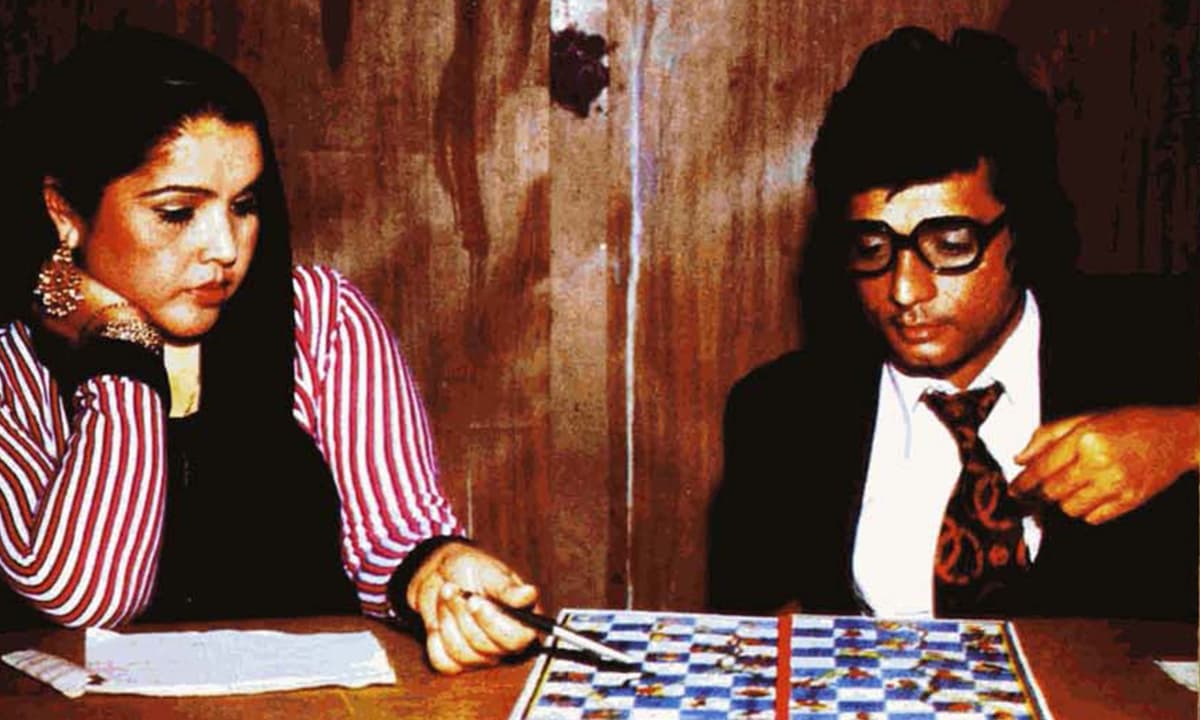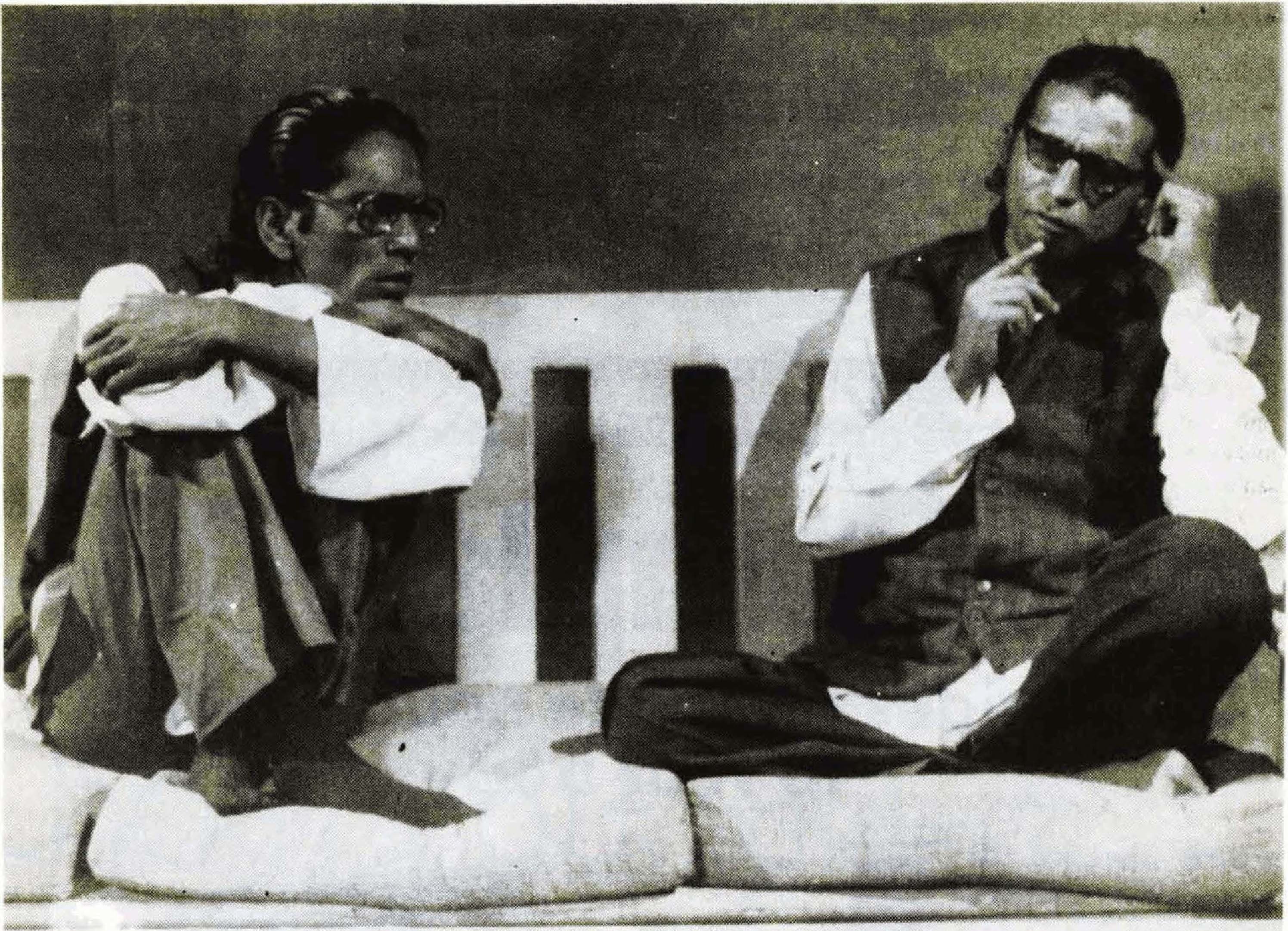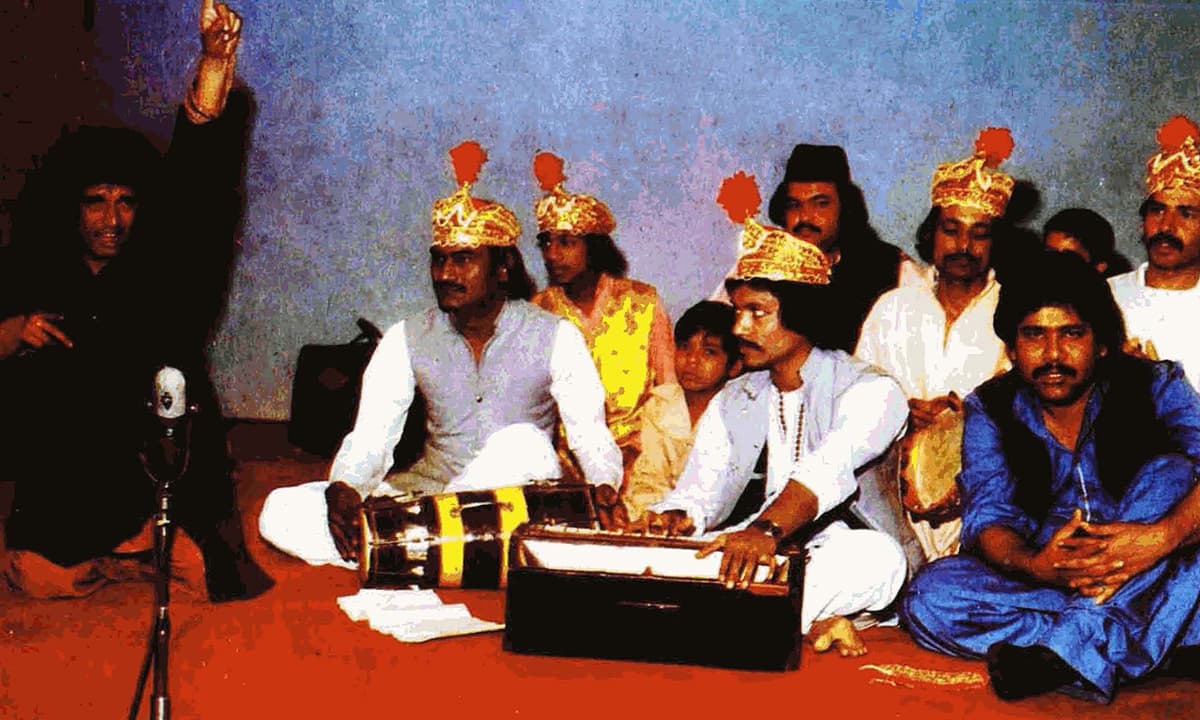
Why, when and how do people laugh? ... The English laugh at things they cannot understand ... Punch, jokes, weather, women, and abstract art. In contrast we laugh at matters we have now understood. For example: The English, romantic poetry, the craft of making money, and basic democracry!”
Mushtaq Ahmad Yusufi wasn’t talking about Fifty-Fifty, of course, but to paraphrase him, Fifty-Fifty makes us laugh on matters we as a nation thoroughly understand – PIA, police, customs and cricket!
And in a language (adulterated of course) we thoroughly enjoy. The memorables ...
“Naheen Rhey! Haan Rhey! Waah Rhey!”
“Yette Katte, Yette Katte”
“Mustan…Mus-Must-Tan…Sa …”
“Shaan se chaliyeh Aan se chaliyeh Pahen ke land eke kapre”
“Hamara Afsar Sarkari Afsar Sab se behtar”
Yes, that’s Fifty-Fifty. A spoof of a washing powder jingle. A punch at the KDA, KMC or KTV perhaps even Fifty-Fifty itself. A qawwali a la Aziz Mian and the Sabri Brothers put together. A take-off of a TV newsreader or commentator … or a Delhiwala, or a Lucknowwala or a Bihari or Hyderabadi. Be they memon, Mekrani, Pathan or Punjabi, Fifty-Fifty hits them all. Nothing is sacred – and for a TV programme, that’s saying a lot.
Humour on TV is in short supply, (just as it is in Urdu literature). In it 14-year-old history, PTV has only a few humour programmes to its credit. There was Kamal Ahmed Rizvi’s hard-hitting Alif Aur Noon and later, Athar Shah Khan’s Intezar Farmayeh.
Then came Sach Gup and Taal Matol (and more recently, the ill-fated Balila) by Shoaib Hashmi. These two programmes dealt exclusively with the hypocrisy and snobbery of the elite. Finally there was Saat Rang, based on satirical pieces written by Irshad Ahmed Khan and monologued by its comperes – Moin Akhtar, Farid Khan and Mushkbaar Fatima. But it exhausted itself in less than 12 months.
When Fifty-Fifty was launched 15 months back, it was an off combination of humour and music. But KTV authorities soon realized that Fifty-Fifty was aadha teetar, addha batair. So they dropped the musical ‘fifty.’ When it was no longer Fifty-Fifty, Fifty-Fifty thrived and clicked!

The secret of Fifty-Fifty’s success, perhaps, is that it’s close to life. The frustrations, the foibles, the pin pricks, the absurdities of daily existence in this country are grist for Fifty-Fifty’s mill. It proved a successful mix, but now both the public and the Fifty-Fifty group are finding that being funny is no joke.
After a year’s stint some viewers find Fifty-Fifty sting gone, its humour insipid and its jingles flat. Fifty-Fifty seems to be heading toward the usual fate of a TV programme … saturation and deflation.
“We tried our best to finish it in December,” says the whole team in unison. “We want to make a decent exit. We would like it to end while it’s in peak form.” But there were orders from Islamabad. Fifty-Fifty was to continue at all cost.
And so the programmed continued. But with a host of problems. Like a change of producer (from Shoaib Mansoor to Bakhtiar Ahmed). And favouritism and jealousy. Minor skirmishes between the artists erupt as major differences… a real clash (”hatha pai”) took place recently between Majid Jehangir and Ismail Tara, Fifty-Fifty’s joint “heroes.”
That Fifty-Fifty team which people adore, which looks like a closely knit funny family ... Let’s watch them behind the scene … On the sets of Fifty-Fifty…
It’s Friday. Recording is in full swing. Majid Jehangir is missing. “Where is Majid?” I ask an artist. “He hasn’t come yet. He comes when he feels like it.” Pat the answer; the tone is indifferent.
They are recording an item on PIA. With Zeba Shahnaz, Ismail Tara and Sakhi Kamal. Bakhtiar Ahmed is giving directions. A few people are sitting on wooden benches, enjoying the recording, letting off occasional suppressed guffaws. I watch them closely. Among them are a few painted female faces ...
We are sitting in the make-up room, a hall with various dressing tables, a few chairs and a girl (probably the make-up woman). She is talking incessantly to someone on the telephone.
Fifty-Fifty is basically team-work, the team informs me. No matter who presents the idea, it is discussed between the writer, the producer and the artists. If the idea is pronounced good enough (by mutual consent) to provoke laughter, it is then evolved in the form of a skit, a jingle or a qawwali.
During rehearsals, the artists keep improvising. There is no rigid script. The actors are enouraged to be spontaneous. ''There have been many instances where we have spoken extempore during the final recording and the performance was appreciated by viewers," says Zeba Shahnaz. "We even discuss set designing."

"People have a grudge against us," says Sakhi Kamal. "They say we don't let any other artist or new talent appear in the programme. We are accused of being against Moin Akhtar and Farid Khan. But when Moin and Farid were doing Saat Rang, did anyone say we should be called in! We don't claim to be the best artists, we don't say we present the best items, but when we have a chance, why shouldn't we take it?" Sakhi Kamal is soft-spoken. He keeps his cool. "As far as new faces are concerned we do not say that new artists shouldn't be encouraged. If they are really talented, they are most welcome.
"It's also said that we've taken over the writing side as well. It's not necessary that only a writer or someone who's an MA in literature can write a humorous piece. It's simply a matter of ideas and imagination. A funny idea may strike anybody. So, we work out our own ideas."
But for how long can Majid Jehangir, Ismail Tara, Sakhi Kamal and Ashraf Khan generate ideas? They are basically artistes, not writers or humorists.
"We certainly agree that we are not writers," says Ismail Tara, who has just finished recording, and looks unusualy serious in an old man's get-up. "Yes, it is a problem. The stage has come where we've run short of ideas. We've requested many people to contribute skits for Fifty-Fifty. Usually every week, ten skits are brought from outside. To approve them is the producer’s job, not our's. The problem is, he selects only two or three – with great difficulty. Naturally the rest of the items have to be presented by us."
Ismail Tara is quite vehement by now. He runs his fingers through his hair to wipe out the white powder. "It's not our fault that the producer gets little help from the writers. People think hamara qabza hai. Listen, we don't own this programme. It's not run on our orders. We work as artists. If we give any suggestions, it's up to the authorities to approve or disapprove. We've been writing for Fifty-Fifty since the beginning. But now our contribution has increased, so why shouldn't we take the credit for it."
Why did the writers who were initially approached quit writing? Says lrshad Ahmed Khan, writer and humorist who initially contributed for Fifty-Fifty, but is no longer asked now: "In Fifty-Fifty script-writing is minimal.
The producer with the help of his artists , transforms an idea into a skit. Sometimes these thoughts do not even require writing. Silently a funny and satirical situation develops. Take for instance, parodies of advertisements, jingles and songs. Those simply require imagination. That is the reason, I think, that writers couldn’t do much for it.”
And why doesn’t Anwar Maqsood write any more?
“We did ask him to contribute. But he’s busy doing his own programme Shosha," clarifies Bakhtiar Ahmed, the current producer of Fifty-Fifty. “It’s not true that he quit because of some misunderstanding between him and the artist.
I personally believe that Fifty-Fifty is the artists’ programme. Not a writer’s programme, nor even a producer’s, in that sense. It’s entirely their show. Writers can only write but it’s the artists who manipulate the idea, maneuver it and present it in a funny way.
“I’m only doing the show for the time being. I’m not involved with it in the real sense. I don’t interfere with the artists. I give them full liberty. I see, of course, that nothing is below standard or dignity. I do reign but I don’t dictate.”

And how do those “censorable items” pass the censors?
Though censorship is mostly self imposed and “moral” as Bakhtiar Ahmed puts it, during editing the programme is scrutinized once more before the final approval by the KTV authorities.
“The producer works under constant pressure and the lurking fear that the jokes he’s producing might go flat. The basic problem is how to maintain the standard. I agree with you that the standard of this programme is falling,” admits Bakhtiar Ahmed.
“But to create humour is no joke. Crudeness can creep in. And it does! This crudeness undermines the aesthetics which are a very important element in any form of art. However, our masses have a tendency to enjoy crudeness, so why should we necessarily avoid it? You know the number one programme on TV’s popularity chart is the Urdu film. Needless to say, our films have a large element of nonsense, and crudity, yet people are glued to the tube every alternate weekend.”
And there is crudeness not only in the jokes but in the artists' behaviour too. Since the artists took up script writing, petty rivalries have become frequent. Claims like, 'It's my idea' or 'I wrote that jingle' are common. And there is the constant fear that there's always someone else ready to take their place.
"Tell me," asks Zeba Shahnaz, the only female artist who has been performing in Fifty-Fifty since the very beginning, "if you remove Majid or Ismail and bring in substitutes, would the programme click?
Zeba has just removed her make-up and is going home for lunch. “If I’m late for Khabarnama, " she adds, “I fear they might get some other girl to sit in my place!”
“The programme shouldn’t be closed down,” says Irshad Ahmad Khan. “It should come out of its present circle. It should expand, try new ideas, introduce new talents, opt for occasional outdoor shooting, for real life situations.”
But despite everything, Fifty-Fifty fans religiously tune in on Tuesday evening. They want fresh entertainment from their old favourites every week. And there’s nothing fifty-fifty about that.
This article was originally published in the Herald's February 1981 issue. To read more subscribe to the Herald in print.










